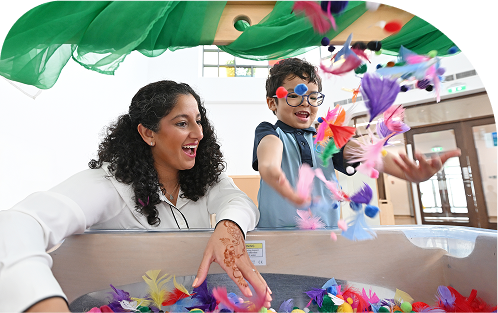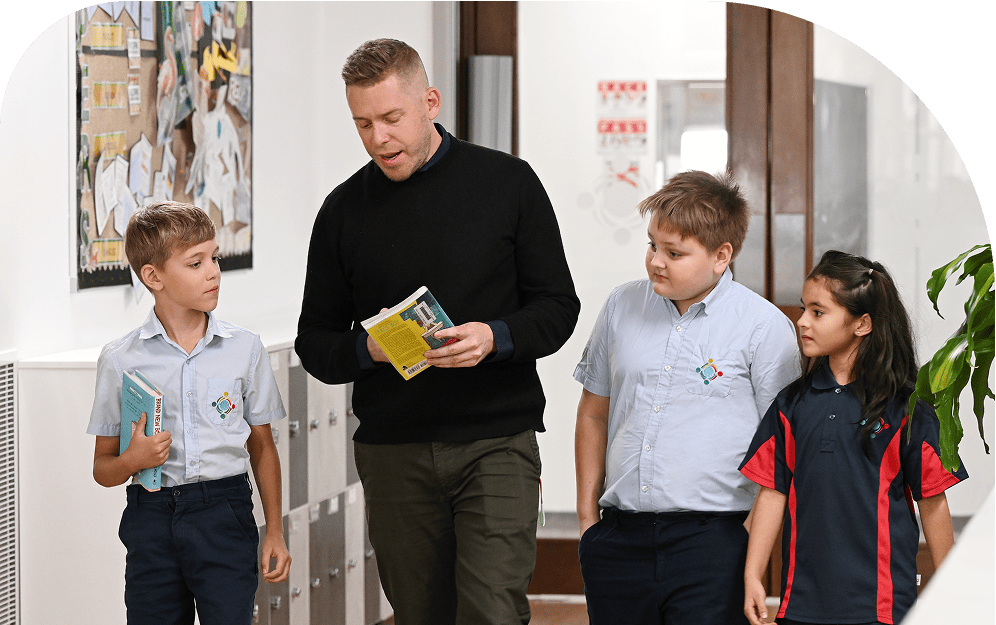Welcome to
Early Years Foundation
Stage
We foster wonder, self-belief, and a curiosity that gains lustre with thoughtful guidance and meaningful relationships
About
EYFS
The early years at WAA are a vital stage of development in which children experience rapid cognitive, social, emotional, and physical growth through quality learning experiences and essential relationships.
We embrace the IB Primary Years Programme, which recognises young learners as curious, capable, and active participants in their own learning. Rooted in constructivist theories, our programme encourages experimentation, inquisitiveness, and discovery through play.
Underpinned by the Early Years Foundation Stage framework, we shape children’s growth through the prime and specific areas of learning. Interconnected within our transdisciplinary curriculum, this allows children to engage meaningfully with concepts.
Through a supportive environment, rich play experiences, and intentional learning engagements, children develop confidence, resilience, and attitudes laying strong foundations for future learning.
Welcome from our
Head of Lower School
Welcome to our Lower School, a place where every child is known, valued, and nurtured. Recognising that each child grows in their own way, following a predictable path but at their own pace, we ensure that their learning is a journey of discovery, filled with the joy of progress and reflection.
We believe in children’s natural eagerness to learn. Our dedicated educators understand that development is multifaceted—cognitive, social, emotional, and physical growth all unfold uniquely for each child. With deep respect for every background and life experience, we create a responsive environment where children feel safe, engaged, and empowered. We foster wonder, self-belief, and curiosity through thoughtful guidance and trusting relationships.
We welcome learners, adapting our approach to meet their developmental needs. Above all, we uplift each child as a whole person, recognising their strengths and making their place within the community. We are proud to be a part of each child’s journey, and we welcome you to our community!
Sabah Rashid – Head of Lower School

Welcome from our
PYP Coordinator
We support our youngest learners through a play-based, inquiry-led curriculum that nurtures curiosity, agency, and holistic development. Rooted in the IB Primary Years Programme, our approach emphasises learning through meaningful, authentic experiences connected to real-life concepts and driven by children’s interests. Learners explore transdisciplinary themes, make personal connections, collaborate with others while building strong relationships, and grow into confident, compassionate learners. We celebrate diversity and foster international mindedness by encouraging empathy, action, and respect for others.
Our educators partner closely with families and continuously reflect on best practices and engage in continuous professional learning to provide an engaging, inclusive, and responsive environment for each child. We are committed to developing lifelong learners who are empowered to make a positive impact in their communities and beyond.
Mark Ryan – PYP Coordinator

Explore our
Early Years Curriculum
Our curriculum blends the IB PYP and EYFS frameworks. Children explore four transdisciplinary themes, including Who We Are and How We Express Ourselves, building foundational skills across all learning areas. The Programme of Inquiry (POI) is reviewed annually to remain relevant, is flexible, and honors children’s developmental needs.
PRIME AREAS
Communication and Language
Children develop listening, speaking, and understanding skills through conversations, stories, and play. Rich language experiences help them express ideas, build relationships, and engage with the world around them.
PRIME AREAS
Physical Development
This area focuses on movement, coordination, and health. Children refine motor skills through active play while also learning about self-care, healthy habits, and spatial awareness to build strength, balance, and composure.
PRIME AREAS
Personal, Social, and Emotional Development
Children build self-awareness, self-esteem, and relationships. They learn to manage emotions, cooperate, and develop social skills, a strong sense of wellbeing and respect for others.
SPECIFIC AREAS
Literacy
Children develop reading and writing skills through phonics, stories, mark-making, and early writing experiences, instilling a love for books and communication.
SPECIFIC AREAS
Mathematics
Focuses on numbers, patterns, shapes, and measures. Through hands-on exploration, learners build problem-solving skills and numerical understanding.
SPECIFIC AREAS
Understanding the World
Encourages engagement with people, places, technology, and nature, helping children make sense of their environment and global connections.
A World of
Learning
Our Early Years learning environment is safe, inclusive, and designed to promote collaboration, belonging, and agency. Reflecting both EYFS and IB PYP principles, it supports hands-on, transdisciplinary learning with rich opportunities for adventuring and interaction. Resources and areas are laid out in the classroom to provoke learning through imaginative play. This continuous provision reflects our focus on all areas of learning, with children always exploring, engaging and enjoying units of inquiry.
Our thoughtfully designed indoor and outdoor spaces encourage creativity, problem-solving, and social development. The environment embodies our community’s values, integrating technology and diverse learning experiences to empower confident, engaged, and independent young learners.
A World of
Sport
Our youngest learners enjoy swimming and physical education classes within the curriculum and school day. Biking on the outdoor track, running and climbing on the playground, and access to the outdoors available from each classroom provide the balance of unstructured time that children need with their peers to make up games, figure things out and amuse themselves.
With a wide range of enrichment opportunities beyond the school day, WAA provides a holistic approach to developing your child’s gross motor skills in one convenient setting. We engage ESM as the provider of sports activities led by dedicated sports coaches: gymnastics, football, tennis, karate, and multisports.
A World of
Innovation
Recognising the rich multicultural community we serve; we incorporate spoken languages through mother tongue lessons and immersive activities such as storytelling. We celebrate world cultures and community day. This supports innate cultural awareness, respect, and a genuine relationship among the community.
Interactive displays and purposeful access to iPads and selected apps enable immersive and creative experiences related to literacy building, numeracy, and problem-solving.
We embrace Seesaw for communication with parents, ensuring families have windows into classrooms to view posted photos and videos while interacting with their child’s portfolio.
We engage Toddle as a platform for teachers to streamline lesson planning and administrative tasks, including the measured use of AI, affording more time building relationships with children.
A World of
Connection
Learning is dynamic and multifaceted—cognitive, social, emotional, and physical growth all unfold uniquely for each child. Teachers lean into bonds with learners, acting as researchers—observing, documenting, and reflecting to shape next steps.
Assessment is a continuous, child-centered process that celebrates individual progress. Guided by EYFS and IB PYP principles, learning is measured against developmental milestones, recognising achievements at each child’s pace.
Over time, children engage with learning goals and success criteria, developing awareness of their own progress. Through modeling and guided practice, teachers cultivate self-assessment skills, promoting self-assurance and enthusiasm for ongoing discovery.
On entry, baseline data is collected to establish starting points for what children know, understand and can do. Progress towards good levels of development is reported termly.
A World of
Happiness
Individuals are better prepared for learning when they are healthy, safe and happy; therefore, wellbeing is the responsibility of all. We create an ethos in which the whole community (children, staff, parents and carers) feel secure, know that they are valued and are encouraged in their learning, growth and social development while recognising how important mental health and emotional wellbeing is in our lives.
Within the leadership team, the safeguarding lead and team share responsibility for child protection.
Within the academic team, individual roles with pastoral responsibilities include year leads and Assistant Head Teachers. The school provides access to student support services including learning support teachers and a school counselor. Beyond the school community, we forge relationships with centres providing a range of external services.
frequently asked
questions
WHAT ARE THE EARLY LEARNING GOALS?
Within the programme there are a total of 7 early learning goals that are categorised into prime and specific areas. The prime and specific areas of learning in the EYFS work together to support a child’s overall development. The Prime Areas—communication and language, physical development, and personal, social, and emotional development—form the foundation for learning. As children grow, these skills enable progress in the Specific Areas—literacy, mathematics, understanding the world, and expressive arts and design. By strengthening the prime areas first, children gain the courage, coordination, and communication skills needed to engage with more complex learning experiences.
WHAT DOES IT MEAN TO BE TOILET TRAINED?
Toileting in the Early Years:
- A child’s ability to undress and position themselves on the toilet
- Use the toilet appropriately
- Carry out intimate care, dispose of trash, and flush
- Dress themselves after using the toilet
- Wash hands and turn off water tap
- Dispose of paper towel in bin
- Leave the restroom
WHICH SUBJECTS ARE TAUGHT BY SPECIALIST TEACHERS?
Teachers who are specialised to teach the arts, physical education, additional languages and religious studies engage learners is the following specialist lessons:
- Visual Art
- Music
- Physical Education
- Swimming
- Arabic
- Islamic Studies (for Muslims only)
*Islamic Studies is compulsory for Muslim students beginning in Year 2.
HOW MANY ADULTS ARE IN A CLASS?
Minimally, every classroom is assigned a qualified teacher and teaching assistant. In instances where an individual assistant is assigned for student support services, there may be additional adult(s) in a classroom.
Blogs
highlights
Early Years Education at GEMS World Academy Abu Dhabi: Building the Foundation for Lifelong Learning
The early years of a child’s education are critical for setting the stage for lifelong learning and development.
As parents, you play an essential role in shaping your child’s learning journey. The Primary Years Programme (PYP) at GEMS World Academy Abu Dhabi is designed to inspire curiosity, creativity.
When it comes to Early Years education, creating a foundation for lifelong learning is crucial. At GEMS World Academy Abu Dhabi, our Early Years curriculum embraces play-based learning.